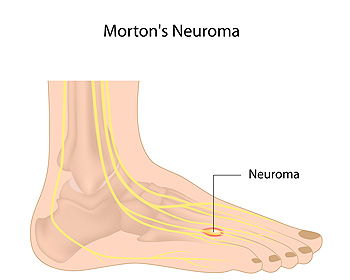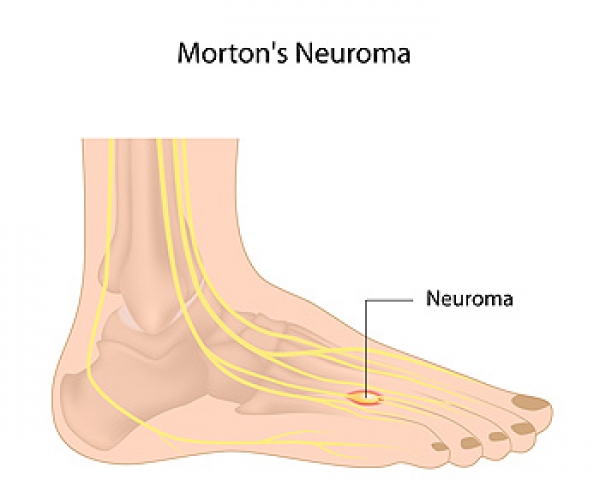 Morton's neuroma occurs when a tissue next to a nerve that leads to one of the toes gets thicker. The pressure against the nerve irritates it and causes the pain, which will usually show up between the third and fourth toes. Women are more at risk for Morton’s than men are. This is due mainly to the pressure applied to the feet when women wear high heels. There are no visible signs of Morton’s, instead you must go by what you feel to detect it. Some symptoms can include a tingling feeling getting stronger as time goes on, shooting pains around the ball of the foot or the base of the toes, burning and numb feelings in the toes and discomfort that may get worse from walking or wearing shoes that squeeze the feet. Simple precautions to take in preventing Morton’s are buying shoes that are wide enough at the toes so they don’t squeeze, choosing athletic shoes with enough padding in the soles to cushion the feet, and refraining from wearing high heels or tight shoes for long periods of time. If you feel that you may have developed Morton’s Neuroma, consult with a podiatrist for the best treatment options.
Morton's neuroma occurs when a tissue next to a nerve that leads to one of the toes gets thicker. The pressure against the nerve irritates it and causes the pain, which will usually show up between the third and fourth toes. Women are more at risk for Morton’s than men are. This is due mainly to the pressure applied to the feet when women wear high heels. There are no visible signs of Morton’s, instead you must go by what you feel to detect it. Some symptoms can include a tingling feeling getting stronger as time goes on, shooting pains around the ball of the foot or the base of the toes, burning and numb feelings in the toes and discomfort that may get worse from walking or wearing shoes that squeeze the feet. Simple precautions to take in preventing Morton’s are buying shoes that are wide enough at the toes so they don’t squeeze, choosing athletic shoes with enough padding in the soles to cushion the feet, and refraining from wearing high heels or tight shoes for long periods of time. If you feel that you may have developed Morton’s Neuroma, consult with a podiatrist for the best treatment options.
Morton’s neuroma is a very uncomfortable condition to live with. If you think you have Morton’s neuroma, contact Dr. Joshua David Scoll of Pennsylvania. Our doctor will attend to all of your foot care needs and answer any of your related questions.
Morton’s Neuroma
Morton's neuroma is a painful foot condition that commonly affects the areas between the second and third or third and fourth toe, although other areas of the foot are also susceptible. Morton’s neuroma is caused by an inflamed nerve in the foot that is being squeezed and aggravated by surrounding bones.
What Increases the Chances of Having Morton’s Neuroma?
- Ill-fitting high heels or shoes that add pressure to the toe or foot
- Jogging, running or any sport that involves constant impact to the foot
- Flat feet, bunions, and any other foot deformities
Morton’s neuroma is a very treatable condition. Orthotics and shoe inserts can often be used to alleviate the pain on the forefront of the feet. In more severe cases, corticosteroids can also be prescribed. In order to figure out the best treatment for your neuroma, it’s recommended to seek the care of a podiatrist who can diagnose your condition and provide different treatment options.
If you have any questions, please feel free to contact one of our offices located in Philadelphia, Bensalem, and Fairless Hills, PA . We offer the newest diagnostic and treatment technologies for all your foot care needs.

